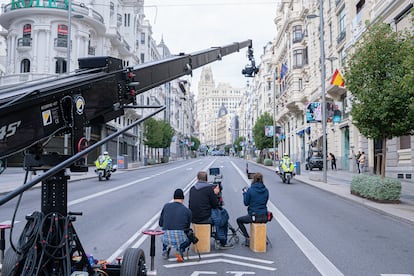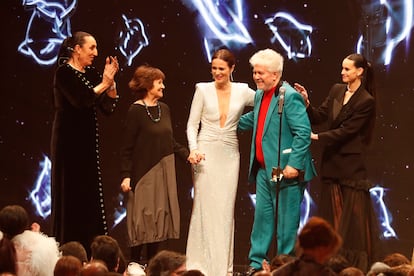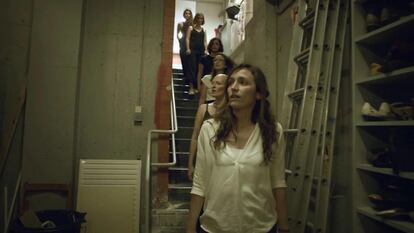The unspoken sexual harassment in Spain’s film industry
Many professionals acknowledge having suffered or known about abuses that were not reported, indicating that the #MeToo movement has failed to make inroads in the country

Very few Spanish actresses have ever reported sexual harassment. Maribel Verdú, who has appeared in over 60 movies in a career spanning several decades, did so when she was still underage, showing up at the police station with her parents. Although awareness of abuse has changed since the #MeToo movement erupted in the US, harassment in the Spanish film industry remains for the most part cloaked in silence, as illustrated by the fact that none of the actresses consulted for this story wanted their names in print.
The phrase: “Nothing major has happened to me. A few uncomfortable situations, but it doesn’t amount to the kind of harassment that you can report, you know?” was repeated time and again. The initial reaction to abuse was denial. This was usually followed by reflection and recollection of one’s own experiences and that of friends. Only then did the actresses perceive in a different light a director grabbing them in a certain way; or a colleague making an unacceptable comment or acting inappropriately. More often than not, their reaction was to keep quiet so as not to create an “uncomfortable” situation.
Perhaps what is lacking in the Spanish film industry is a figure as odious as American producer Harvey Weinstein, whose abuse launched the MeToo movement in Hollywood at the end of 2017. His behavior caused shockwaves that drove feminist activism and changed working practices in film, not only in the US but in a number of countries around the world. But in Spain, the extent of the revolution has been to establish that it is no longer normal for an actor to tell an actress prior to shooting a sex sequence: “Let’s ‘warm up’ for a while before we start filming.”
This was, in fact, a suggestion made to one of the actresses interviewed for this story. With the support of the director, she managed to side-step the “warm-up” that the actor – “from another generation” – had proposed. “I didn’t need to warm up or anything of the sort,” she says. “I looked at the director, said ‘please’ and he immediately got things [the filming] started.” As on other occasions, the actress recognizes that she didn’t make a fuss because she didn’t want “to create an uncomfortable situation.”
Better filming protocol
But there have been positive changes on shoots, not only because of the increased awareness triggered by the MeToo movement, but also because of the introduction of the intimacy coordinator in 2018. “Our job is to ensure that when it comes to sequences involving nudity, sex or intimacy, that safety and respect are maintained while the director still achieves his creative vision,” Amanda Blumenthal, a pioneer in the field, told EL PAÍS in 2021. These coordinators are still a novelty on Spanish shoots and their very existence indicates that respect is not always a given.
Spanish film veteran Maribel Verdú, 52, whose career started at the age of 13, described her harrowing experience with actor José Luis Manzano while filming La estanquera de Vallecas (The Tobacconist of Vallecas) on the Mercedes Milá TV talk show. “He treated me very badly,” she said.
Verdú tells EL PAÍS that now “people are prepared to speak out, knowing that action will be taken on the matter.” So why have there been no formal complaints? “I don’t know who complains and who doesn’t, but 40 years ago I did complain, supported by my parents,” she says, although she prefers not to name her aggressor.
In the Spanish film industry, an unwritten protocol is applied – the same one used by several opera singers and women working with Plácido Domingo in the US: basically, to never be alone with someone likely to take advantage of them. One producer recalls a shoot in which the costume designer told her that when the young leading actress changed her clothes, the director stayed on to watch. They consequently made sure there were always several people present – people who suggested the director should leave the room. “It happened more than a decade ago, and yes, it resembled the protocol used with Domingo,” she says.
Off-set, especially on promotional trips that involve many hours together in locations that are not strictly work-related, such as hotels, airplanes, awards ceremony after-parties and festivals, there is plenty of opportunity for harassment. One actress recounts a promotional event at which a director kept flirting with her, forcing her to make it clear to him, in front of the rest of the cast, that she was not interested. “The next day, he kissed me in front of everyone as if to prove that he had screwed me,” she recalls. “Nowadays, maybe I would have slapped him to make it clear that he was an asshole and that he hadn’t screwed me.”

This incident is similar to the one experienced by actress Jedet at the last Feroz Awards party. According to witnesses consulted by EL PAÍS, the producer Javier Pérez Santana forced himself onto several people at the party, “touching” them and “kissing them on the mouth and neck” without their consent. Some, such as the journalist Bob Pop, whom he tried to kiss on three occasions, did not give the incident much importance: “I thought: ‘I’ve been touched by the party slime bag.” But, belonging to another generation, Jedet, the 30-something Poison actress, considered it to be sexual assault, and asked the awards organizers to call the police, who arrested the producer.
A lack of complaints
Judith Colell, producer, director and president of the Catalan Film Academy, points out that her institution has a department to deal with abuses in the audiovisual and performing arts, “and there are programs with protocols and protection for victims,” she adds. “But it is true that I don’t know of any recent legal complaints because we are a smaller industry, and the victims want and need anonymity. I don’t know of any direct cases, but I know of rumors. What has become clear after the Feroz case is that not everything is allowed.”
“The slime bag has always existed, and not only in cinema, but in all cultural spheres,” says Berta Ojea, actress and founder of the Actors and Actresses Union Equality Secretariat. “Until you make it clear that a problem exists, it doesn’t exist.” The performer, who is no longer at the head of this organization, recalls how at the beginning of this century, when she launched this initiative to flag up inequality in the sector, a lot of cases were brought to her attention, cases that did not involve “filing a complaint.” Ojea differentiates between situations in which the victims are merely seeking advice and support and those in which they go to the authorities. Of the latter, “there were very few,” she says.
Other interviewees stress that they know of cases of friends who have been urged to file a complaint, but... “I understand,” says one filmmaker. “They are young actresses and afraid to take the risk. Someone with prestige and an established career should come forward so that the others can follow in her footsteps. It has to happen like in the Weinstein case, in which the people around him also complained, disgusted as they were by his behavior. The onus must not only be on the victims, but also on those who protect the harasser – they also have to step forward.”
Sharing this view is Cristina Andreu, president of CIMA, the association that brings together female filmmakers. “We are waiting for the Goya Awards to be over to send a letter to our members urging them not to remain silent,” she says, referring to an approach that was launched in 2021. “On that occasion, no one contacted us,” she says. “Things haven’t changed – we shouldn’t be fooled by the fact that cases are not made public: we work in a small industry where fear prevails.”

Andreu has collaborated in the Goya-nominated documentary The Yellow Ceiling, by Isabel Coixet, which tells the story of nine women who filed a complaint against two of their teachers at the Aula de Teatro de Lleida in 2018 for sexual abuse that occurred between 2001 and 2008, when they were teenagers. It was too late: the complaint was made too many years after the alleged crime according to the statute of limitations and could no longer be tried. On February 1 of this year, another student who was at the same drama school four years ago filed a complaint against the teacher and director of the school, Antonio Gómez. “This case has not prescribed, and we hope that this sexual predator will at last go to jail,” says Andreu.
Coixet flags up “the fear of never having another opportunity, because you live in a precarious environment” especially in the case of actresses who are just starting out. “My documentary poses the question: how can we ask people to make a formal complaint, if they are then discredited, and asked to justify their own behavior.”
In Spain, there has been a notable lack of people coming forward to report abuse as happened in the wake of the Weinstein case and, later, with Plácido Domingo. “Women do not make formal complaints because this is also about machismo and the patriarchal system – because we see the victim as the problem, not the aggressor,” argues Ojea. “They have already been abused and then we’re asking them to be heroines on top of that.”
Veterans of Spanish cinema who did not report abuse at the time assume that doing so now would have no legal consequences due to the statute of limitations. Another deterrent, in the words of one interviewee, is that “some of them are mothers who do not want to bear the shame of having their children know what happened to them.”
Power figure
During Ojea’s time as head of the Actors Union’s Equality Secretariat, the cases that were reported did not name any names. “The cases were taken to the producers so that they would know what was going on,” she explains. There are no detailed reports and no significant volume of complaints. What does seem to be common to all, however, is the power figure who assumes he can act with impunity. In one instance, one of the actresses interviewed was grabbed by such a figure after a clash over a work issue and told, “You and I, what we have to do is fuck.”
A patriarchal system was blamed again and again by the actresses consulted for this story, who said the harassment is not specific to the film industry. “This happens to us because we are women,” is a phrase that was repeated during the 10 interviews. Still, the fact that movie shoots involve physical proximity, not to mention the idea that actors are expected to do whatever they’re asked for the sake of art, means that the movie world is perhaps more open to abuse.
In a bid to avoid the issue, María Zamora, producer of Alcarràs, winner of the last Berlinale award, has chosen to work with only female directors. “It has been a very conscious decision,” she says. “The situation has not changed because the problem is social – it goes beyond cinema. In our industry, the American MeToo movement has not had any repercussions. We haven’t gotten beyond asking ourselves why there isn’t a Spanish MeToo. We are still afraid of being told we’re exaggerating, of being told that, well, you know what he’s like, that he is drunk and other excuses along these lines. Jedet’s complaint does mean, however, there are red lines that can no longer be crossed. And that’s a positive thing.”
Sign up for our weekly newsletter to get more English-language news coverage from EL PAÍS USA Edition
Tu suscripción se está usando en otro dispositivo
¿Quieres añadir otro usuario a tu suscripción?
Si continúas leyendo en este dispositivo, no se podrá leer en el otro.
FlechaTu suscripción se está usando en otro dispositivo y solo puedes acceder a EL PAÍS desde un dispositivo a la vez.
Si quieres compartir tu cuenta, cambia tu suscripción a la modalidad Premium, así podrás añadir otro usuario. Cada uno accederá con su propia cuenta de email, lo que os permitirá personalizar vuestra experiencia en EL PAÍS.
¿Tienes una suscripción de empresa? Accede aquí para contratar más cuentas.
En el caso de no saber quién está usando tu cuenta, te recomendamos cambiar tu contraseña aquí.
Si decides continuar compartiendo tu cuenta, este mensaje se mostrará en tu dispositivo y en el de la otra persona que está usando tu cuenta de forma indefinida, afectando a tu experiencia de lectura. Puedes consultar aquí los términos y condiciones de la suscripción digital.








































